The Best Perennials, Bulbs And Shrubs For Early Spring Flowers
These easy-to-grow perennials, bulbs and shrubs with early spring flowers are a sight for sore eyes after a long winter and require very little maintenance.

There is something about the first flowers to bloom in the spring that make them near and dear to every gardener's heart.
After looking at brown grass (or lots of snow depending on where you are), the bright colors of these early bloomers are a welcome sight.
As an added bonus, most of these early spring plants are really easy to grow and require very little in maintenance other than some pruning to remove dead leaves or branches.
And they are all perennials, bulbs or shrubs, so you only have to plant them once to have years of spring enjoyment.
Keep reading to find my favorite early spring flowers.
Early spring bulbs
Some of the best early spring flowers come from bulbs.
While they bloom in the spring, these bulbs should be planted in the fall.
So you'll need to add them to your list for ordering later in the season.
Snowdrops

Scientific name: Galanthus nivalis
Zone: 3 to 8
Exposure: part shade
Height: 8″ to 10″
Width: 3″ to 6″
Bloom time: late winter, early spring
Bloom color: white with a green spot at the apex
Snowdrops have small nodding teardrop white flowers that are one of the first to emerge in the late winter.
The gray-green grass-like foliage come up just prior to the blooms and dies back in late spring.
Plant the small bulbs in drifts 2 to 3″ deep in a woodland garden where they will naturalize.
Crocus

Scientific name: Crocus
Zone: 3 to 8
Exposure: sun, part sun
Height: 2″ to 4″
Width: 2′ to 4″
Bloom time: late winter, early spring
Bloom color: purple, blue, orange, pink, white, yellow
Crocus are one of the earliest blooms to break through the snow crust in late winter.
Their beautiful colors and sometimes fragrant blooms will brighten up any garden.
Which is why they are one of the most popular early spring bulbs.
Crocus corms should be planted in well-drained soil 3 to 4 inches deep, in bunches of 10 or more.
Water well and cover with mulch.
They will naturalize over time, although preventing the squirrels from eating them before that happens can be a challenge.
Reticulated iris
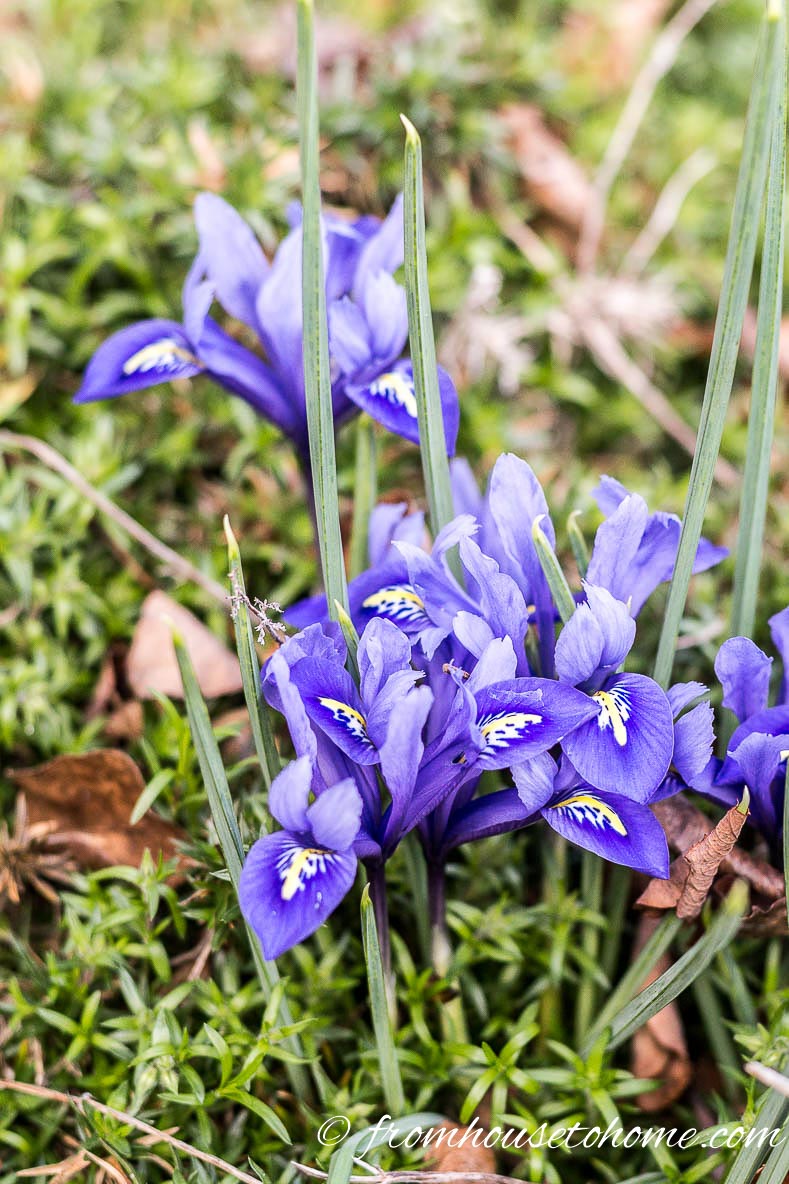
Scientific name: Iris reticulata
Zone: 4 to 9
Exposure: Sun to partial shade
Height: 6″ to 8″
Width: 2″
Bloom time: Early spring
Flower color: Blue, purple, white, yellow
Iris reticulata is one of the earliest blooming bulbs in the spring.
They are very short, reaching only about 6″ in height. (These are not the tall flag-type irises that bloom later in the spring or early summer.)
Unfortunately, the blooms don't last very long (about a week in my garden).
But they are so bright and beautiful that I think they are worth planting anyway.
These Irises are available in a variety of colors but I love the bright blue ones. I grow them through my creeping phlox which helps to hide the Iris leaves after they are done blooming.
Plant the bulbs in the fall to get blooms the next spring.
Daffodils

Scientific name: Narcissus
Zone: 3 to 8
Exposure: Sun to partial shade
Height: 18″ to 24″
Width: 6″ to12″
Bloom time: Early spring
Flower color: White, yellow, orange
Daffodils are another really easy to grow bulb that is one of the first to bloom in the spring.
Unlike tulips, they grow well even with the warmer winter weather where I live.
And unlike crocuses, the squirrels don't like them. Which means they actually stay where you plant them.
Plant at least 10 bulbs about 3 inches apart and 6 inches deep in the fall and you'll have beautiful spring flowers for many years to come. They will spread out over time creating a beautiful clump of blooms.
If you are not a huge fan of yellow, newer varieties come in shades of pink or white.
The leaves can be a little unsightly after the flowers have finished, so planting the bulbs with later blooming plants is a good idea.
Early spring perennials
Trailing or creeping phlox
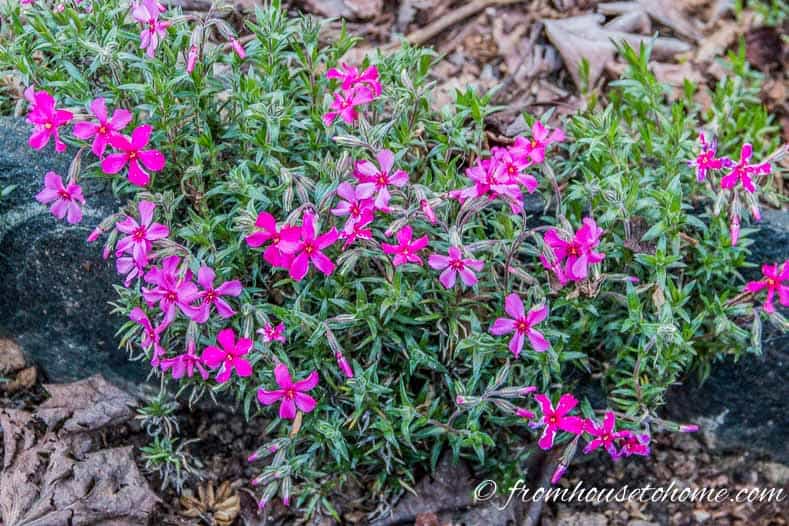
Scientific name: Phlox subulata
Zone: 2 to 9
Exposure: Sun to part shade
Height: 4″ to 6″
Width: 12″ to 18″
Bloom time: Early spring
Flower color: Pink, white, purple
Trailing phlox is a very low-growing evergreen plant that spreads out over the years, but is not invasive. If you are patient, 3 or 4 of these plants can eventually line a 6 foot sidewalk.
They look great growing over garden edging, as ground cover or in a rock garden, and are completely covered in blooms in the early spring.
There is a limited color selection (purple, pink or white), but you can add some extra interest by combining them with spring bulbs such as daffodils, tulips or irises which look beautiful growing up through the low-growing phlox.
Lungwort
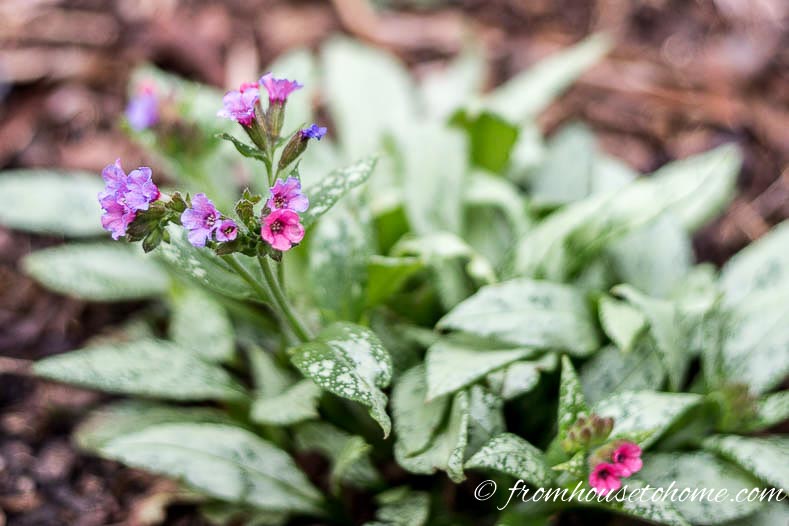
Scientific name: Pulmonaria
Zone: 3 to 8
Exposure: Shade to part shade
Height: 8″ to 12″
Width: 12″ to 18″
Bloom time: Early spring
Flower color: Pink, purple, blue
Lungwort is a semi-evergreen low-growing perennial that has clusters of dainty blooms in the early spring, and is much prettier than the name suggests!
One plant can produce blue, pink and purple flowers all at once. So you get a pretty mixture without having to do anything special.
It also has very pretty leaves. Depending on the variety, the foliage can be variegated, silver or spotted which makes it an interesting woodland plant all year round.
Lenten rose

Scientific name: Helleborus orientalis
Zone: 3 to 9 (evergreen in zones 6 to 9)
Exposure: Shade to part shade
Height: 15″ to 18″
Width: 18″ to 24″
Bloom time: Late winter / early spring
Flower color: White, yellow, purple, pink, black
Hellebores are one of the first flowers of spring.
They are low-growing perennials that grow in clumps and start blooming in late winter or early spring.
Even in Canada, their flowers can be seen peeping out from the snow in February.
Once they start blooming, they have the added benefit that the blooms last for quite some time. In my South Carolina garden, the first flowers appear in February and are still going strong in April.
Plus they are very easy to grow…I don't do anything to them other than cut off the odd dead leaf.

They are available in a wide variety of colors and bloom types, so you should be able to find one that fits in with your garden.

Hellebores are fairly short, like a shady spot and will spread out some (but are not invasive). So plant them in a location where they have a little room to grow.
The plants can be a little gangly in the summer. Planting them with something that comes out a little later and also likes the shade (like Hostas) will help provide some distraction.
Find more information on how to grow Hellebores.
Perennial primrose

Scientific name: Primula vulgaris
Zone: 3 to 8
Exposure: part shade, morning sun only
Height: 6″
Width: 6′ to 8″
Bloom time: late winter, early spring
Bloom color: purple, yellow, red, pink, blue, or white
There are many varieties of early blooming perennial primulas that produce a profusion of flowers in the early spring.
They die back to the ground in the heat of the summer but often reappear again in the cool days of autumn.
They are all easy care perennials that should be planted about 10″ apart in humous rich soil where they will get some afternoon shade.
The plant spreads slowly by rhizomes and is very easy to grow.
Since there are many types of primrose, be sure to read the tag carefully when you are buying them to assure that you are getting a perennial variety which blooms in the spring.
Primroses are also rabbit and deer resistant.
Liverwort

Scientific name: Hepatica nobilis
Zone: 4 to 9
Exposure: part shade to full shade
Height: 4″ to 6″
Width: 6″ to 9″
Bloom time: early through mid spring
Bloom color: blue, white, pink, purple
Liverwort is a one of the spring’s earliest native woodland plants that can cover the ground with its small blue wildflowers in early spring.
It has bright blue, lavender, pink or white blooms with evergreen leaves.
It is very easy to grow and has a fresh, delicate scent that smells like spring.
The flowers may not fully open on a rainy day but even the half-opened flowers are a bright spot in the garden.
Winter heath

Scientific name: Erica
Zone: 5 to 7
Exposure: Sun
Height: 12″ to 18″
Width: 12″ to 24″
Bloom time: Late winter or early spring
Flower color: pink, purple, white
Winter heath (Erica) is a low-growing evergreen shrubby perennial that is covered with small white, pink or purple flowers in late winter to early spring when not much else is blooming.
It is an easy-to-grow plant that spreads slowly to create a dense ground cover that deer ignore.
Winter heath should be watered regularly when it is first planted but is quite drought tolerant once established.
Early spring flowering shrubs
Since many of the early-blooming flowers are fairly low-growing, planting a few early flowering shrubs helps to bring the color up higher in the garden.
Which makes more of an impact from a distance.
Star magnolia
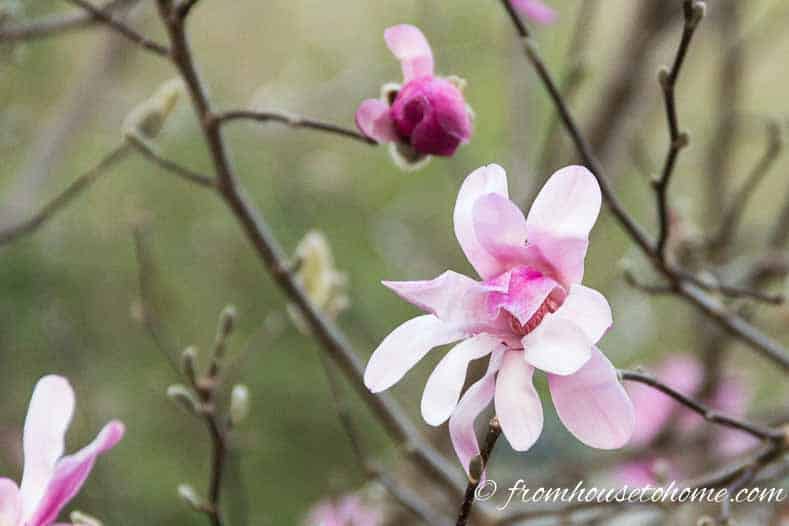
Scientific name: Magnolia stellata
Zone: 4 to 8
Exposure: Sun to part shade
Height: 15′
Width: 8′
Bloom time: Early spring
Flower color: Pink, white
There are many different types of magnolias that grow in many different climates and bloom in different seasons.
I think all of them are beautiful but I am particularly fond of the Star Magnolias.
Their early spring flowers come out before their leaves, usually in late February or early March in my Zone 7B South Carolina garden.
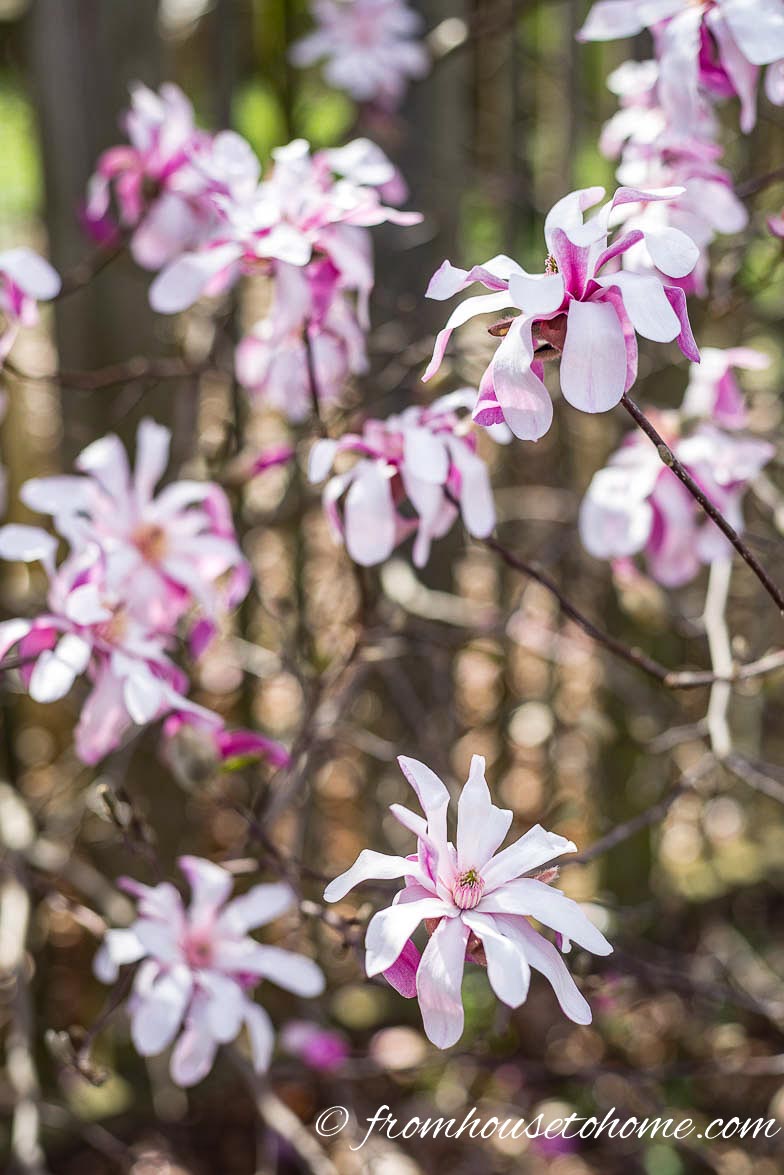
They generally have pink or white blooms with several petals that give them a star-like appearance.
Once the leaves do come out, they are pretty, glossy and dark green making a good backdrop for other plants.
These bushes grow to about 8′ wide by 15′ high so make sure to plant them in a location with a little room to grow.
Camellia

Scientific name: Camellia japonica
Zone: 7 to 10
Exposure: Shade to part shade
Height: 4′ to 20′ (depending on the variety)
Width: 4′ to 8′
Bloom time: Fall, winter, spring (depending on the variety)
Flower color: Pink, white, red
Camellias are another easy-to-grow shrub (or small tree if you cut off the lower branches as they grow) with early spring flowers.
They have evergreen, dark green leaves which is an added bonus.
Bloom times can be anytime between the end of October and the beginning of May, depending on the variety.
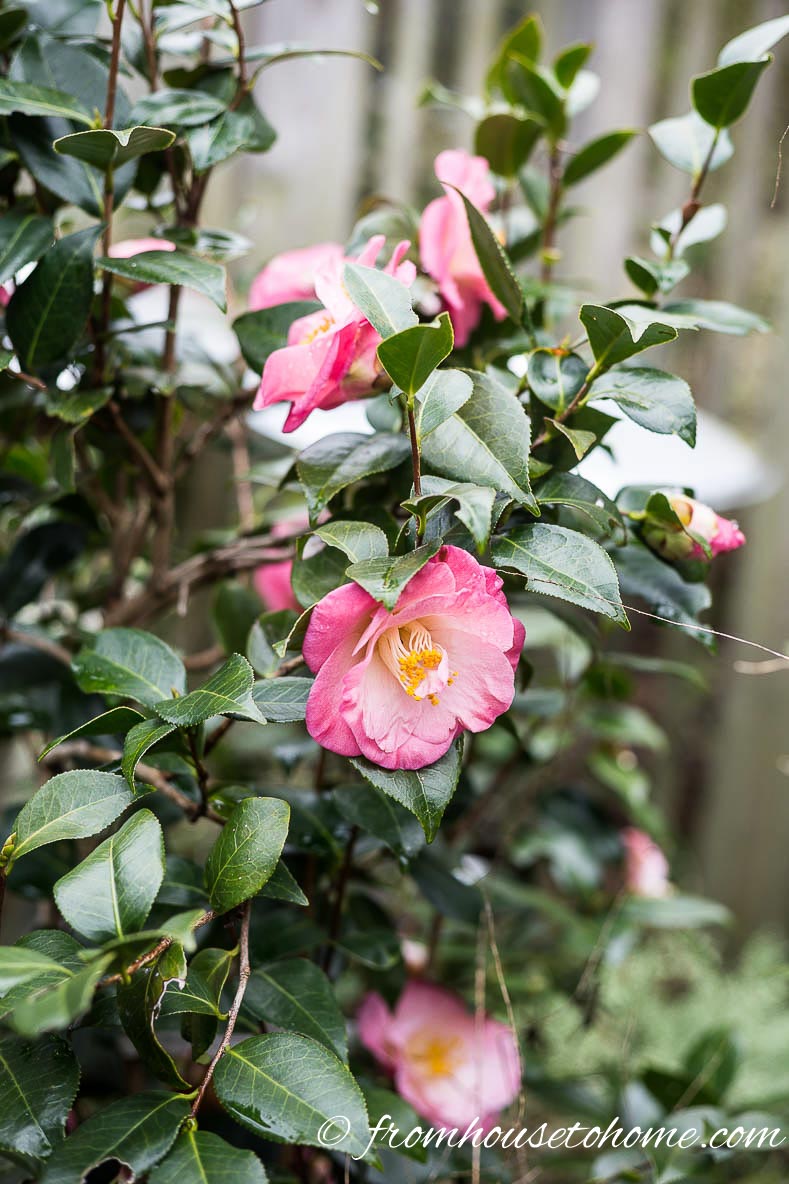
Camellias require slightly warmer conditions than some of the other plants in this list. But if you live in a zone where they survive, it's hard not to have at least one in your garden.
I have enough varieties in my garden that there is usually at least one blooming all winter long.
It does take them a couple of years to get going after they have been planted, but once established, they are covered in blooms.
Find out more about growing Camellias.
Forsythia
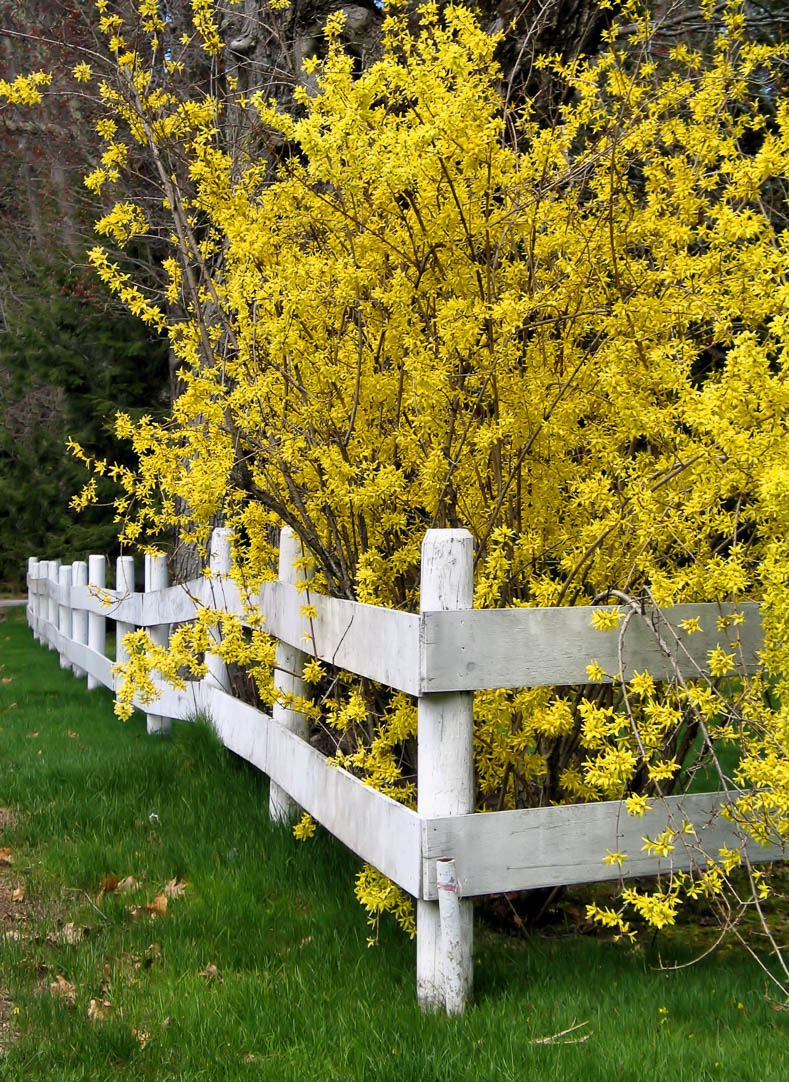
Scientific name: Forsythia
Zone: 4 to 8
Exposure: Full sun to part shade
Height: 3′ to 8′
Width: 4′ to 12′
Bloom time: Early spring
Flower color: yellow
Forsythia is an easy to grow shrub that produces bright yellow flowers as soon as the snow is melting.
They are so cheerful that it's hard not to fall in love with them.
After a winter of gray skies and cold weather, they always remind me that sunshine and spring are on the way!
This shrub is very easy to maintain, only requiring pruning once a year after it has bloomed to keep it in check.
Winter Daphne

Scientific name: Daphne odora
Zone: 5 to 10
Exposure: Part shade to shade
Height: 3′ to 5′
Width: 3′ to 5′
Bloom time: late winter or early spring
Flower color: pink, white
Winter Daphne is a small, evergreen shrub that has clusters of very fragrant pink or white flowers.
These early spring bloomers have leaves that are either glossy dark green or variegated depending on the variety.
And it has a beautiful mounded shape that doesn't get too big. So its perfect or the small urban garden.
Plus, having a plant that blooms so early in the spring and smells heavenly is a combination that's hard to beat!
Find out more about growing Daphne.
There you have it…my favorite early blooming spring flowers. Hopefully you have found some inspiration to get your own spring gardening going.
Other early spring flowers you might like
- Early spring purple flowers
- Early spring white flowering trees
- Perennials, bulbs and shrubs with early spring white flowers
- Early spring yellow flowers
- Early spring blue flowers
Or browse all of our spring plant posts.
Have comments or questions about our list of perennials, bulbs and shrubs with early spring flowers? Tell us in the section below.
This post was originally published on February 26, 2018 but was updated with new content on November 23, 2024.

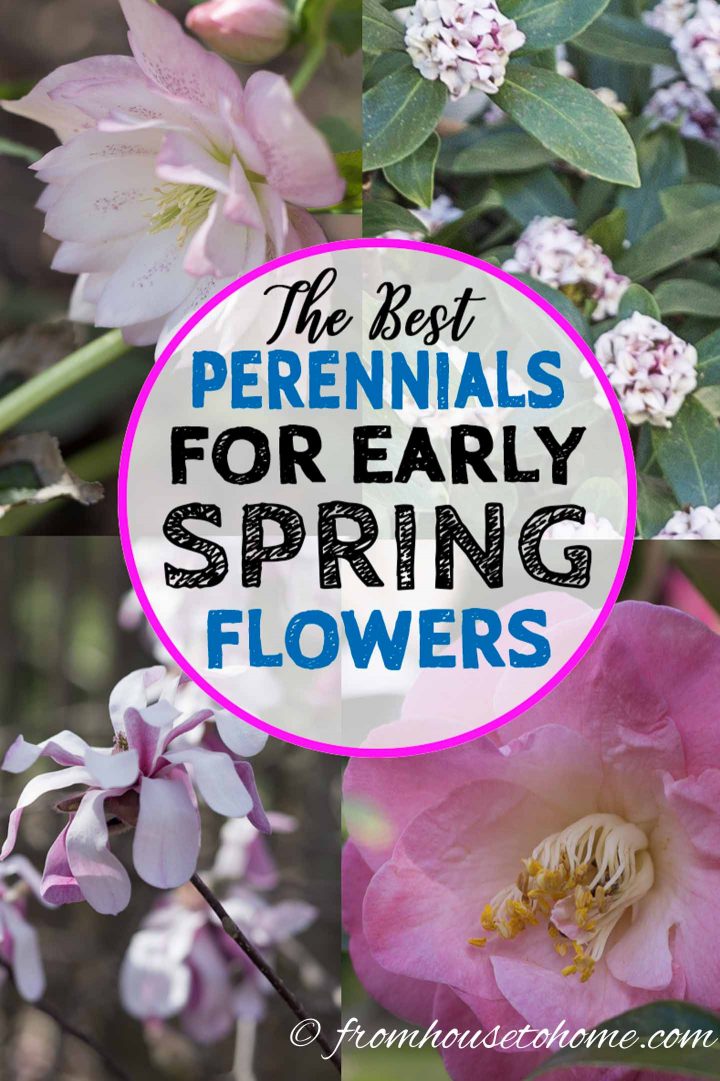
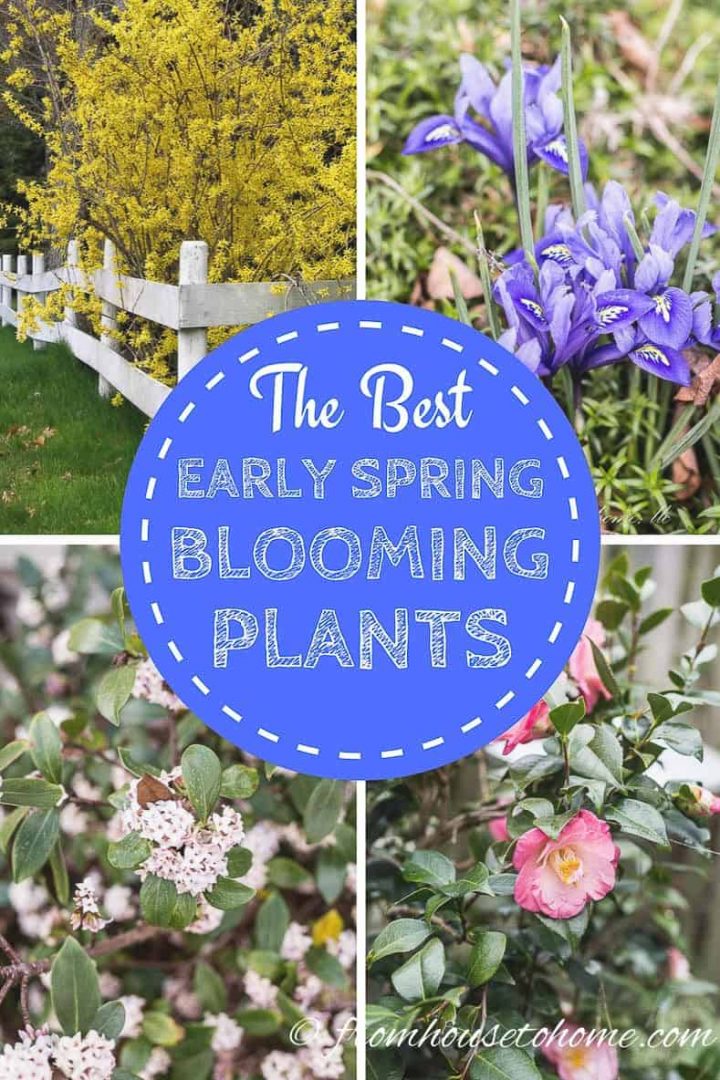
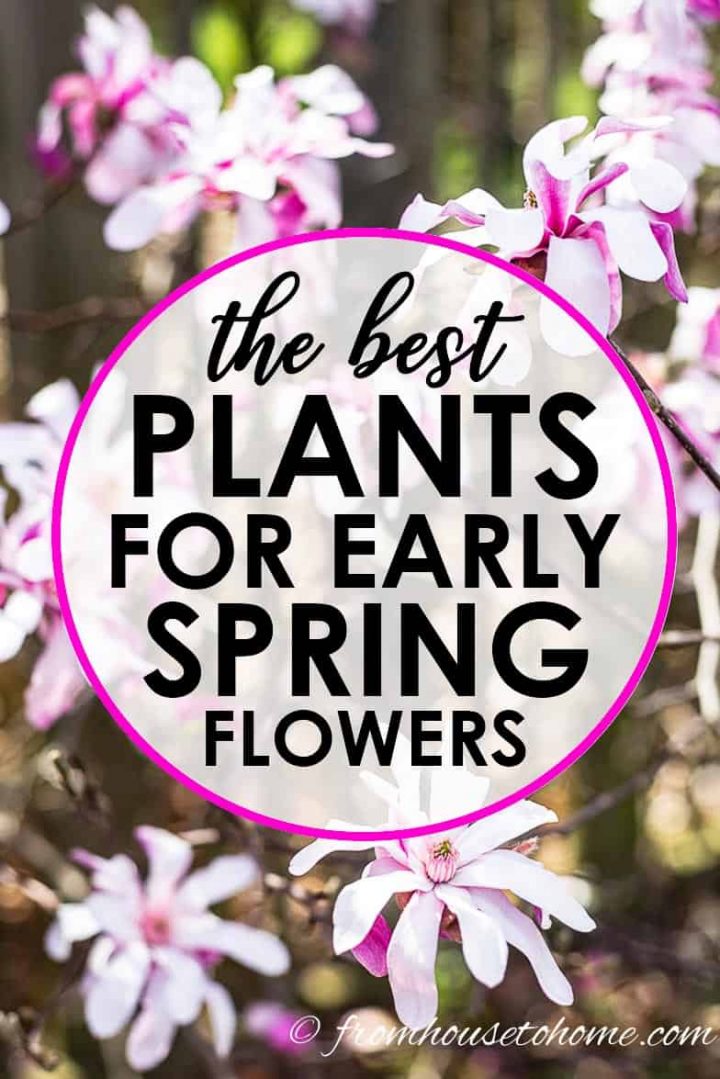
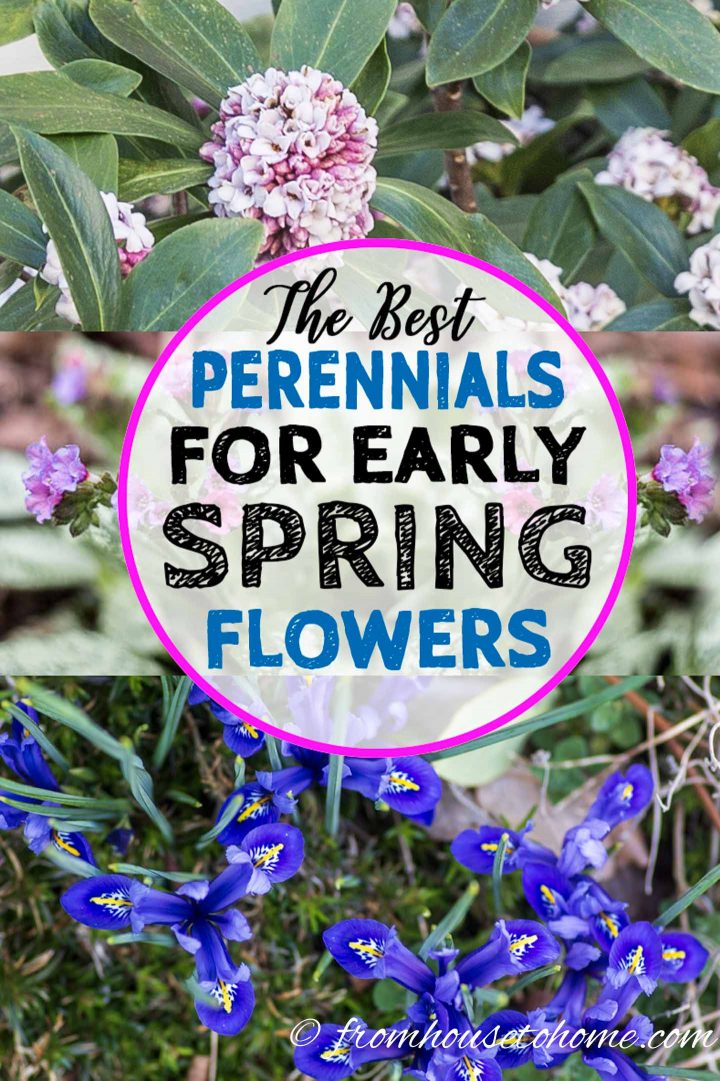
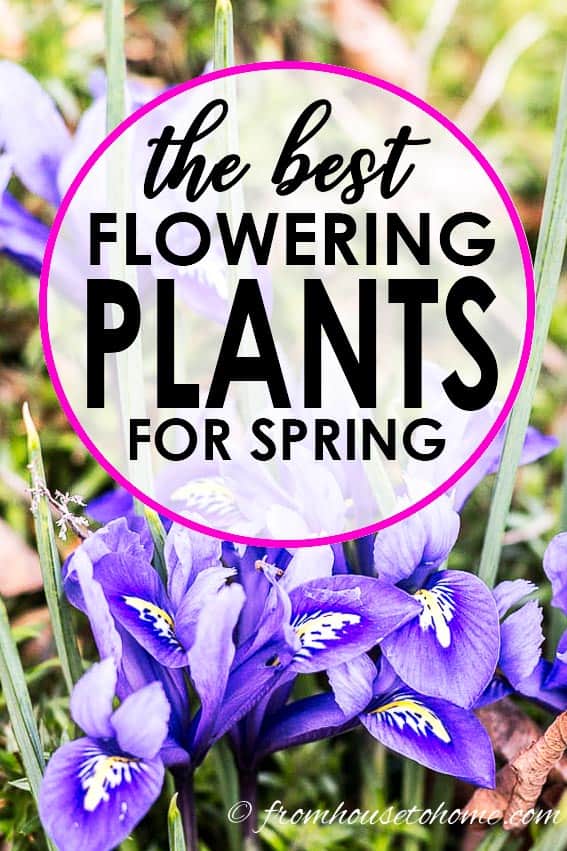
Wow, so pretty. I am in love.
Thanks, Ivory! I love spring flowers, too 🙂
where can we buy these? especially the Siberian Squill and also the ones you listed above here… 🙂
Hi Felicia…You can find Siberian Squill here. They are bulbs so they won’t be available until the fall (although you can order them now to be delivered later). I also updated the other links in the post so they are in stock.